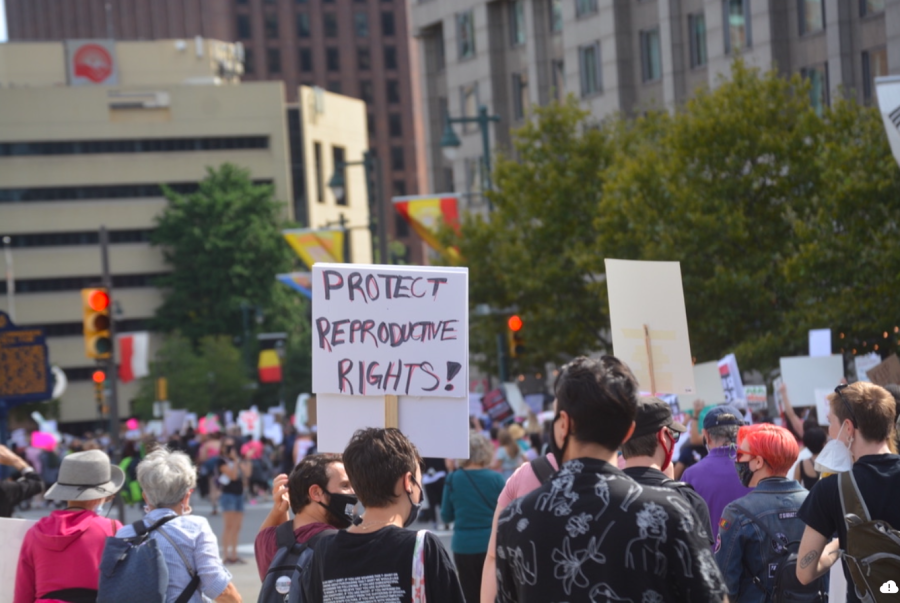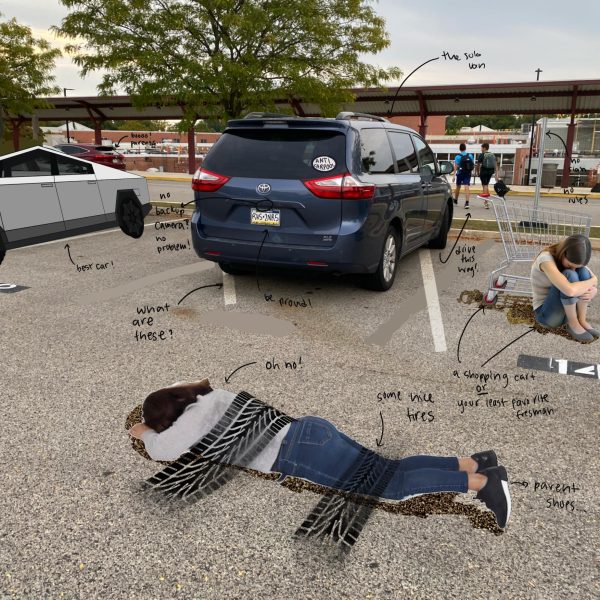Don’t take abortion in Pennsylvania for granted
Protestors at the Philadelphia “Bans Off Our Bodies” march in October 2021. Photograph by Sammy Rosin
September 26, 2022
“While nothing has changed since the Supreme Court decision, everything could change very quickly here in Pennsylvania. We are not a secure state,” Dr. Alhambra Frarey, a physician at Penn Medicine and an Assistant Professor of Clinical Obstetrics and Gynecology, told me over the phone a few weeks ago. When the Supreme Court overturned Roe V. Wade on June 24, 2022, trigger-laws immediately banning all abortions went into effect in 12 states, and in the weeks that followed, many other states enacted strong restrictions. Current Pennsylvania governor, democrat Tom Wolf, promised to block any of the Republican legislature’s efforts to ban abortions in the state, but his term, along with any guaranteed safety for abortion care, comes to an end this November.
Whom Pennsylvania chooses as its governor on November 8th will result in two drastically different outcomes. Doug Mastriano, the Republican candidate for governor, sponsored a bill as a state senator in 2019 that would have outlawed abortions after 6 weeks, meaning before most people* know they are pregnant. In a statement on May 3, 2022, Doug Mastriano said, “Our nation is now on the precipice of reversing this science-denying genocide. Thanks to President Trump, a conservative majority on the Supreme Court is set to right this historic wrong. Since I was elected to the Senate, there has been no more important issue to me than the right to life.” According to WHYY, “Mastriano also opposes exceptions for rape, incest, or a parent’s life being in danger during pregnancy. He supports criminal penalties for doctors and nurses who perform abortions.”
If the democratic candidate, Josh Shapiro, wins the governor’s race, abortion will likely remain protected in the state; however, even with a pro-choice govenor, abortion access in Pennsylvania still faces a threat from a constitutional amendment that the legislature in Harrisburg intends to push forward. The amendment, which would likely be on the ballot in the spring of 2023, dictates, “There is no constitutional right to taxpayer-funded abortion or other right relating to abortion.” Even a pro-choice govenor would not have the power to reverse this statute. Both the Pennsylvania House and Senate have already passed the bill once, and if the same bill passes again in the next legislative session, it will be up to voters to decide the fate of abortion in the state. (In Pennsylvania, the legislature must pass a proposed amendment to the constitution twice, in two consecutive legislative sessions, before it goes to voters as a referendum). As Dr. Frarey emphasized, “These are really life or death consequences for the [future of people seeking] abortion care here in Pennsylvania.”
Many people view abortion as a political or religious issue, which prevents them from seeing the critical nuances of abortion care. Dr. Frarey explained, “The patients that I care for are making really thoughtful decisions that sometimes feel straight-forward, like they just know what’s right for them. And sometimes [the decisions] are really complicated and filled with grief and loss. But at the end of the day, everybody’s decision is unique. And so you can’t put it in a box that you can reasonably make rules about. Politicians who are trying to legislate how this kind of healthcare is delivered are missing the complexity of it, that every person and situation is unique and different, and that everybody should have the right to decide what is best for themselves, for their bodies, for their economic security, and for their futures.”
Abortion is more common than it is portrayed in the media. According to the Guttmacher Institute, 24% of women in the U.S will have an abortion by the age of 45. Fifty-nine percent of these women obtaining abortions are already mothers. In 2020, the Guttmacher Institute found that there were nearly 930,000 abortions performed in the country. Abortion care is a fundamental aspect of women’s healthcare, and discussing it with a political or religious lens distracts from the true purpose of treating women as independent, valued members of our society. As Dr. Frarey emphasized, “I care for patients, for example, who are ending a wanted pregnancy, who may have gone through multiple cycles of IVF (in vitro fertilization) to finally become pregnant like they’ve always dreamed of, and then that pregnancy is complicated by a terrible fetal health complication, where they have a terrible heart defect or they’re going to be born with no kidneys or things like this that are incompatible with life. And patients are making really difficult decisions that are selfless and based in a deep love for the future child they dreamed of parenting.”
In addition, abortion bans do not just infringe on the rights of women, but they disproportionately affect people of color and people living in poverty. Based on CDC data collected from 30 states in 2019, Black women accounted for 38.4% of abortions received in the country. The CDC also found, “Non-Hispanic White women had the lowest abortion rate (6.6 abortions per 1,000 women) and ratio (117 abortions per 1,000 live births), and non-Hispanic Black women had the highest abortion rate (23.8 abortions per 1,000 women) and ratio (386 abortions per 1,000 live births).” Forty-nine percent of women who received an abortion live below the federal poverty level. The reasons for high abortion rates in these groups stem from a multitude of issues, including inability to access to contraception and to health care in general. As a result, women living below the poverty line will have the hardest time accessing abortions now that so many states have restrictions. When women are denied abortion care, it can send them farther into poverty. According to a study done by the National Library of Medicine, “Women denied abortions were more likely [than women who obtained abortions] to be in poverty for four years after denial of abortion.” In addition, women who were denied abortions were “less likely to be employed full time and were more likely to receive public assistance than were women who obtained abortions.”
Even high schoolers can help to advocate for and improve women’s healthcare in our country. To start, as a society, we need to work to de-stigmatize women’s healthcare, especially regarding abortions. Dr. Frarey said that despite how common abortions are, one of her biggest challenges as a provider is the “stigma surrounding care.” Due to this social condemnation, “people don’t talk about [abortions]. People don’t share their experiences.”In addition to encouraging open conversations about abortion in society in general, the most important step high school students can take to protect women’s right to choose is to exercise their constitutional right to vote if they are old enough. Students, and all people eligible to vote in this year’s election, need to educate themselves and think deeply about their values and how they want the person they’re voting for to represent them. Of course, there are many high school students, like myself, who cannot yet vote, but we can still take meaningful action. For students both of voting age and younger, Dr. Frarey urged, “[Have] a conversation with people in your life about why this matters to you, why this is important, how you feel personally affected by the fact that there are politicians trying to limit your access to health care and limit your bodily autonomy, limit your ability to decide what is best for your future. “ The supreme court decision in June sparked passionate reactions and eye-catching headlines, but a few months later, this attention to the issue has begun to dwindle. However, Dr. Frarey reminds us, “We cannot let this be yesterday’s news or fall off the radar.” Instead, we need to keep access to safe and legal abortion care at the center of attention going into this election cycle and beyond, until the fundamental right to this care is guaranteed everywhere.
Without the universal protection of Roe, many doctors are more hesitant to provide certain women’s health care procedures given the harsh punishment for breaking the law. But the line between legal and illegal operations can be quite murky. Dr. Frarey explained, “It’s often in [the] setting where you’re allowed to proceed with the care if it poses a threat to maternal life. What does that mean? Has this person bled enough if they’re clearly having a miscarriage, but there’s still the motion of heart cells present on the ultrasound. Can you intervene even if they’re hemorrhaging, or have they not lost enough blood for the procedure to be legal? Or somebody has signs of the developing infection, but it’s not yet so progressed that it’s really a life threatening infection: can you intervene in that pregnancy?” The fear among patients and providers, flamed by the overturning of Roe, causes this confusion and puts people who can get pregnant in real danger. Your parents, siblings, or maybe even you yourself, have the power to keep our state safe from this frightening reality with the simple act of voting.
*It’s also important to acknowledge that women are not the only ones affected by the decisions regarding abortion care. This issue affects all people who can get pregnant, including non-binary and transgender people.







